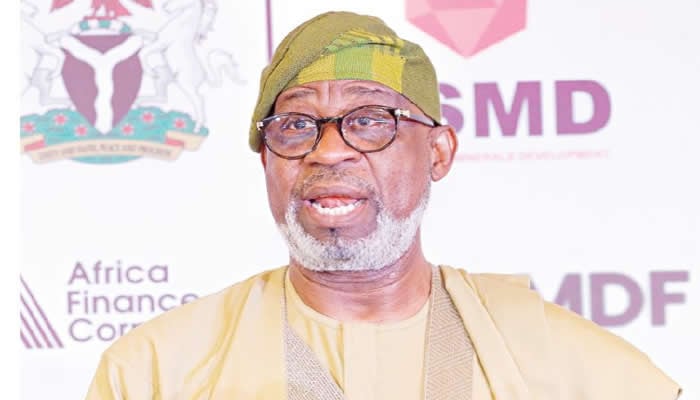The Minister of Solid Minerals Development, Dele Alake, has called on international investors to increase their stakes in Nigeria’s solid minerals sector, citing ongoing reforms that have made the country one of the most attractive destinations for mineral investment globally.
Speaking on the theme “Connect and Collaborate, Co-Build and Co-Share” at the 2025 China Mining Conference in Tianjin, Alake outlined several initiatives by the Federal Government aimed at boosting investor confidence and ensuring maximum returns.
He said the introduction of Mining Marshals and the satellite mine monitoring system has significantly improved security around licensed mining sites and helped curb illegal mining activities that have long plagued the sector.
According to a statement signed by his Special Assistant on Media, Segun Tomori, the minister also highlighted technological upgrades that have simplified business operations and application processes within the sector.
Alake listed innovations such as the Electronic Mining Cadastre, the Nigerian Mineral Resources Decision System, the Centre of Excellence, and upgraded websites for the ministry and its agencies as tools that enhance transparency and enable seamless remote transactions for investors worldwide.
He assured participants that these reforms were part of President Bola Tinubu’s broader economic diversification agenda, which seeks to unlock the country’s vast mineral wealth, attract foreign capital, and create jobs across value chains.
Alake reiterated that Nigeria possesses over 44 commercially viable mineral deposits, ranging from gold and lithium to nickel and barite, and urged Chinese and other global investors to take advantage of the enabling environment to participate in exploration, processing, and value addition.
Reviewing the Chinese mining business, Alake acknowledged that investments in lithium processing alone grossed $1.3bn since September 2023, adding that MOUs signed by President Bola Tinubu during the state visit in September 2024 have led to substantial investment commitments.
He said, “Since September 2023, when this administration assumed office, Chinese companies such as Canmax Technology, Jiuling Lithium, Avatar New Energy Nigeria Company, and Asba have invested over $1.3bn in lithium processing.
“The investments have boosted Nigeria’s economic diversification efforts, reduced its dependency on oil and attracted infrastructure, technology transfer, and expertise. Joint ventures between Chinese and Nigerian companies in the mining sector often enhance local capabilities and skills among Nigerian workers and engineers.”
Alake, who is currently the chairman of the Africa Minerals Strategy Group, reaffirmed Nigeria’s commitment to strengthening
continental cooperation in mineral exploration and reporting standards, stating that Africa must build shared systems of knowledge and governance if it is to fully benefit from its vast
mineral endowments.
He reaffirmed plans to strengthen the regional Centres of Excellence in Geosciences and Mining Skills and to expand the role of the Solid Minerals Development Fund and the SMDF AFC Facility in supporting early-stage exploration and de-risking investments.
“We warmly invite investors, development partners, and technical institutions to explore Nigeria’s vast opportunities in minerals such as lithium, gold, lead-zinc, barite, and rare earth elements. Our government offers a conducive investment climate, improved security of tenure, and incentives that guarantee mutual benefit.
“Nigeria’s vision is not only to extract minerals but to build a globally competitive value chain that supports clean energy transition, job creation, and industrial growth, all within the framework of responsible mining,” he said.
Representing Nigeria in the technical session on “Mining in Africa and Policy”, Director General of the Nigeria Geological Survey Agency, Professor Olusegun Omoniyi Ige, highlighted the National Mineral Resources Data System and Nigeria’s
extensive aeromagnetic and geochemical datasets, which together provide a solid foundation for informed mineral exploration.
He noted that while these datasets have greatly improved the country’s geological understanding, greater investment is still required to expand exploration coverage and convert data into proven mineral resources.
Other speakers included Mr Xu Xueyi, Deputy Director General of the China Geological Survey; H.E. Mohamed Ahmed Taha, Minister of Minerals of Sudan; Ms Phumzile Mgcina, Deputy Minister of Mineral and Petroleum Resources of South Africa; and Mr Joseph Lebbie, Director General of Geological Exploration, Sierra Leone.















